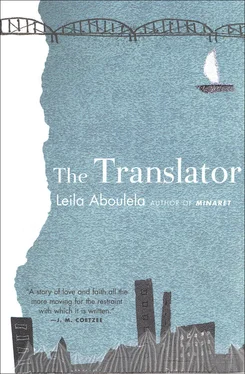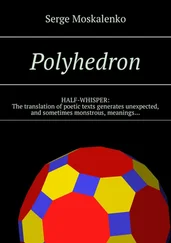He will get in touch with me, he will not leave me like this, she thought in Alexandria and in the southern province of Souhaig, and she thought wrong. She hoped and she worked hard pushing Arabic into English, English into Arabic, staying up late with hotel smells, typing out all the interviews. She looked as weary as the young men she put the questions to everyday, thin and disillusioned, their fingers gripping cigarettes, bravado and dreams. She put to them questions made up by others, then turned their answers into English words… ‘I worked as a helper in a beauty salon, the usual things, sweeping hair from off the floor, washing towels…’ ‘My brother served time and when he came out. .’, ‘My father worked in Baghdad and lost his job when the war broke out…’, ‘We live ten, one room…’ When they spoke they addressed her. Only one of them looked her straight in the eye, baiting, different than the others, ‘I was in America,’ he said, ‘Massachussetts. I was there so I know what I’m talking about. Western men worship money and women. Some of them see the world through dollar bills, some of them see the world through the thighs of a woman.’ He spoke like that but she remained numb, numb about everything, silent when the others later, over lunch, could speak of nothing else. She smiled stupidly when she was told, ‘I’m sorry you had to go through that. Most unpleasant.’ She remained numb until she reached Khartoum, walked into her aunt’s house and saw Tarig’s picture on the wall.

She turned the key of the post-office box and found a reply from the Personnel Department. She owed the University one month’s salary because she had not served her notice. She turned the key of the post-office box and found nothing, not even the formal reply she expected from him. She turned the key of the post-office box and found a letter from Yasmin. She had given birth to a baby girl, she was on maternity leave now, no longer going to work. There was no mention of Rae in the letter. There was the excitement of the baby and ‘You are doing the right thing, Sammar, staying with your family, not coming back… we too would like to leave Britain…’
She turned the key of the post-office box and found nothing. She turned the key of the post-office box and knew she would find nothing. She gave the key back to Hanan, saying, ‘I’m not expecting any more mail.’ Even if he wrote what she wanted him to write, ‘I didn’t mean it when I said, get away from me’, what would be the use? They could not have a future together, it would not be enough.
Her future was here where she belonged. She belonged with her son and strangers who smiled when she came into a room. She should not delude herself and with time she would forget. The sun and dust would erode her feelings for him. She must give away the bottle of perfume he had given her. She must pull his words out of her head like seaweed and throw them away.
Here. Her life was here.
Starting a new job, getting used to teaching, linking faces to names. Picking Amir and Dalia up from school. Housework, in the evening a social life, everyone indoors by the eleven o’clock curfew. Visitors or calling on people to offer condolences when death came, congratulations when a baby came. Welcome to the one who arrived from abroad, goodbye to the one who was going away. And bed-ridden people who spoke in faint voices, the smell of sick rooms.
Here. Her life was here.
Life was the dust storms that approached rosy brown from the sky, the rush to slam shut windows and doors, the wind whistling through bushes and trees. Brief mad storms and then the sand, thick sand covering everything, whirls of soft sand on the tiles to scoop up and throw away. To beat out of curtains, cushions, pillows, to dust away from the surface of all that was still. Sand eternally between the grooves of things, in folds of skin, the leaves of the children’s books. And life was the rain that came at dawn with lightening, fat drops on the dust, the sun defeated for a day. Just a day, a softening, a picture of the past, the empty square covered in silver, laid out with the colour of the moon. Someone to talk to…
Remember Hanan, one day you and I walking in our school uniforms to get milk from the store. There was no school because of the rain. We went in the morning, found it closed and came back. But we stayed with our uniforms on all day.
Remember Sammar, how Tarig used to ride his bicycle through the puddles on purpose, every puddle from here to Airport Road.
Remember Hanan, the day we went to the Blue Nile cinema and it started to rain on top of our heads and Tarig just sat there watching the screen.
Remember the day, remember the time. Remember Tarig. Hassan looked like him, his uncle who had never seen him. Only Hassan not Hussein, they were not identical twins. Even Amir did not look like his father as much as Hassan did. Isn’t that strange? she said to Hanan, as they folded the washing together, so much washing, hills of clean clothes to sort out and smooth into neat piles.
Week after week. Stroking Hassan’s hair, watering the garden, removing seeds from slices of watermelon. Watching Hanan’s baby grow, the first day he ate beans, the first day he tasted mangoes and how his nappy looked after that. The door bell and rushing from indoors, down the steps of the porch to drag open the black metal gate. Miranda for guests, ice cubes, a dish of sweets to pass around. ‘Water,’ some would say. ‘Just get me a glass of water, Sammar, nothing else.’ She fell in love with Amir again. She carried him around the house, like Hanan carried her baby. They played a game, they pretended Amir was a baby again and she had to carry him. Only in this game could he be sweet and clinging. At all other times, he was aloof, independent, never afraid. He neither remembered nor missed his father. He had lived quite content without his mother. There was something unendearing about her son: a strength, an inner privacy she knew nothing about, shut out by guilt and her years away. Only in this game of baby and mother were they close. Carrying him around the house, not minding that he was heavy. Do you know, baby, that you were born in a cold country and you wore white wool. Baby, do you want to go outside to the garden? Look, this is a tree, this is the grass. What’s that? in his pretend baby voice, pointing up. What’s that? An airplane. It takes people away, far away from here.
The new job. Different people, classes held in different locations. Some of the ‘Erasing Illiteracy’ classes were in the evening at the university. Palm trees and a campus shabby with crumbling walls, undergraduate students not so well dressed or healthy looking as the ones she used to see in Aberdeen. Like all the other evening classes, her class took a break for the sunset prayers. They would leave the room where the fan whirled overhead blowing sheets of paper off the desks, and step into the heat of outside. She never knew who spread out the palm-fibre mats on the grass. They were always there when she came out. Beige and a little rough on the forehead and the palms. When she stood her shoulders brushed against the women at each side of her, straight lines, then bending down together but not precisely at the same time, not slick, not synchronised, but rippled and the rustle of clothes until their foreheads rested on the mats. Under the sky, the grass underneath, it was a different feeling from praying indoors, a different glow. She remembered having to hide in Aberdeen, being alone. She remembered wanting him to pray like she prayed, hoping for it. The memory made her say, Lord, keep sadness away from me.
She kept busy so that there would not be pauses in the day to dwell. She tired herself so that there would not be dreams at night. Toilet training the twins, watching videos with everyone: thrilling American films, loud Egyptian soaps. Taking her aunt to the doctor, listening to her aunt on the way back, ‘My son would have been a great doctor like him…’
Читать дальше













